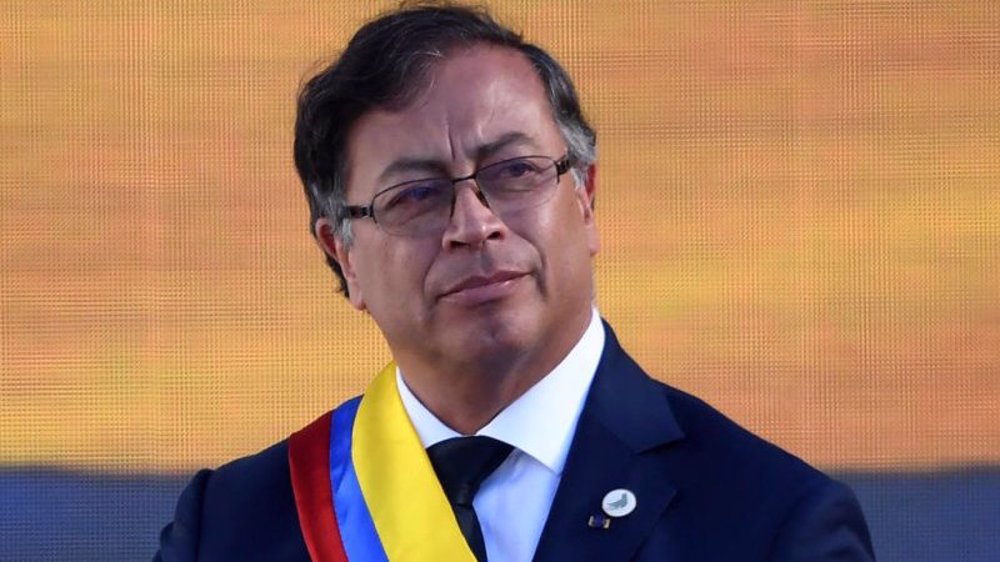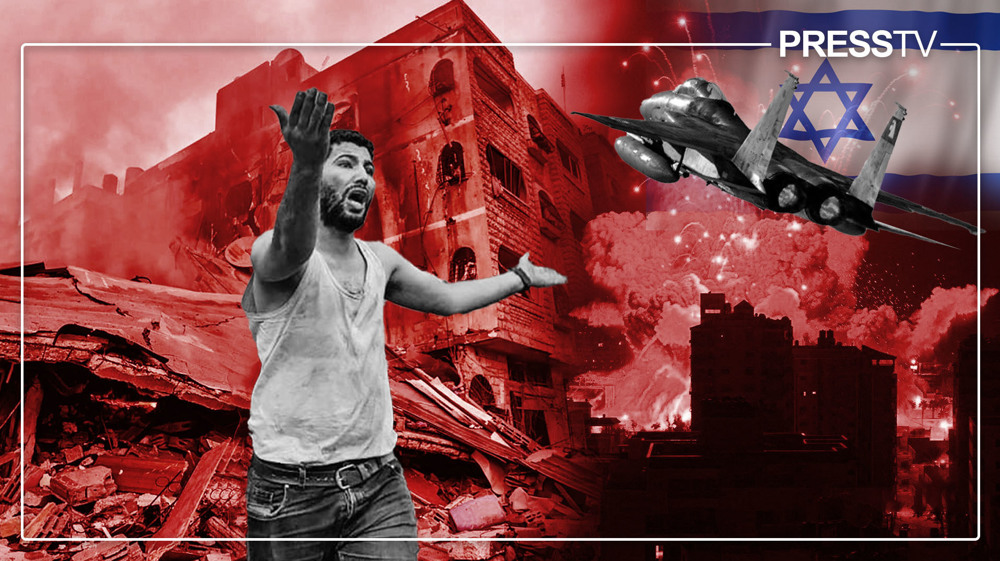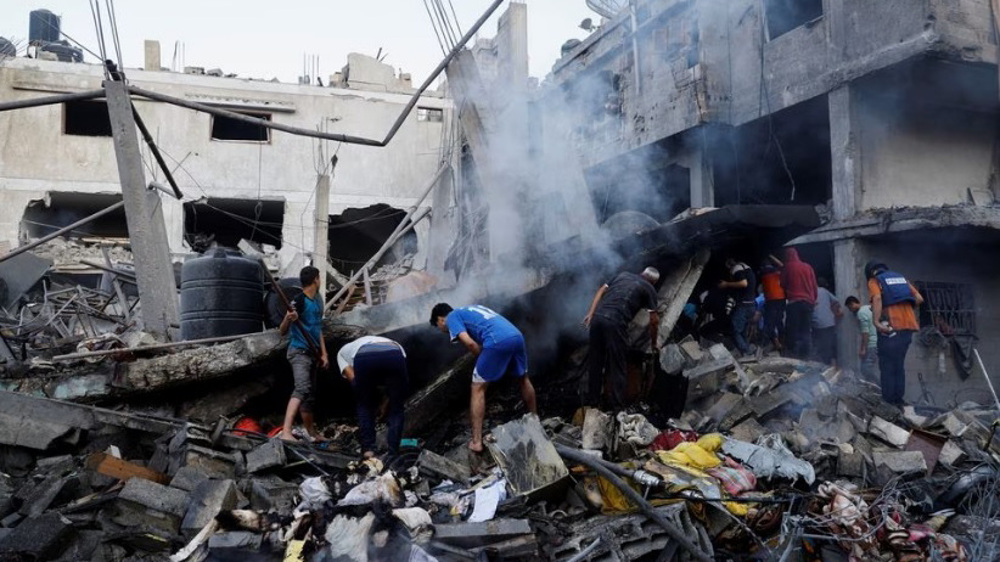As Israel bombards Gaza and murders Palestinians, where is the United Nations?
By Marzieh Hashemi
As the Israeli regime continues to commit horrendous war crimes against the Palestinian people in general and specifically those in the besieged Gaza Strip, many are wondering where the United Nations (UN) is and why it is doing nothing to stop the ongoing genocide.
Let’s analyze the reasons the so-called international community has chosen to be silent and impotent in preventing thousands of tons of bombs from raining down on civilians in the Gaza Strip or in ensuring that people there have access to basic necessities.
First, one must understand the so-called “rules-based international order” that was created to protect the interests of Western hegemonic powers by setting up certain international organizations and formulating rules that the rest of the world should follow.
The United Nations is an integral part of this so-called “rules-based international order.”
When we examine this world body and the reasons behind its creation, much can be understood. The main goals of the UN are stated to be “maintaining international peace and security and protecting human rights, along with delivering humanitarian aid.”
For the most part, the reality seems to be quite different.
The United Nations was set up by the Allies of World War II, immediately following the war. The roots of this organization were not based on implementing equality amongst member countries or even having representation based on population, but its founding was created to protect the interests of the Allies, mainly the United States.
The UN Security Council’s veto-wielding nations are five countries that were Allies during World War II – the United States, England, France, the Soviet Union (now Russia) and China.
Having veto power means that when there are currently 193 countries, that are members of the UN General Assembly, if all of them vote for a resolution and only one of the members of the Security Council vote against it, nothing would be implemented. That resolution won’t make the headway.
It becomes clearer that the United Nations is not some egalitarian entity, trying to protect human rights and what’s best for all member states. It is an elitist body, created to protect the interests of the former Allies.
However, what ensued immediately following its creation was that the interests of these five member states changed with the existence of the Eastern Bloc led by the Soviet Union.
After the collapse of the Soviet Union in 1991, the United States basically reigned as king in the world again without much opposition from other Security Council members, pushing through its own agenda, until Russia started to reclaim its sovereignty again in the early 2000s.
And currently, there are schisms in the bloc as the world is transitioning from a unilateral to a multilateral world and there is a juxtaposition of power. Thus, we now see more of a divide among Security Council members, which for example prevented the UN from implementing sanctions against Russia for the Ukraine war, because Russia could veto any resolution in which it disagreed.
There is an innate bias to begin with at the UN and there are concrete examples of how this plays out globally, from which countries are sanctioned and which are not, to which leaders are tried at the International Criminal Court and which ones are not.
Looking at the UN’s involvement in just two countries, the bias of the organization becomes clearer.
First, let’s take a look at what happened in Iraq. In October of 1990, the Saddam Hussein-led regime invaded Kuwait. Four days after the invasion, the United Nations implemented a blockade against Iraq, not that the UN was particularly worried about Kuwaitis, but it was worried about Kuwait’s oil.
The sanctions against Iraq were severe with a total blockade on financial transactions as well as an embargo imposed by the UN Security Council’s Resolution 661.
Even later, the sanctions would increase, as the UN started calling for the removal of weapons of mass destruction (WMDs) inside of Iraq, which were never found.
The initial sanctions CAME simultaneously with the implementation of a US-led military action by land and by air. The original goal of the sanctions was stated to be for Iraq to leave Kuwait.
Iraq’s invasion of Kuwait ended in February of 1991. However, the economic blockade on Iraq lasted until after the US invasion and overthrow of Saddam Hussein in 2003.
For 13 years, the Arab country reeled under strict economic control by the so-called international community. According to UNICEF estimates, more than 1.5 million Iraqis, mostly children, died due to these crippling sanctions.
It appears that when the United Nations wants to implement force against a country, it can do so quickly and even cause extreme suffering, which is what happened in Iraq.
The UN doesn’t seem to have a problem ignoring the ramifications, even if it takes the lives of 1.5 million people. Perhaps they are just considered collateral damage.
Take the case of Libya. On February 15, 2011, the international community said a civil war began inside that country. By March 17, 2011, the UN Security Council had implemented resolution 1973. That gave way to military intervention in Libya, along with the implementation of a no-fly zone.
By October, the former ruler of Libya, Moammar Qaddafi was killed and by October 23, the war was declared over. Prior to that war, Libya had the strongest economy in Africa. After the war, the country has never been the same, spiraling into poverty, civil war and even slavery.
When it comes to the UN and crises around the world, it has been quite selective in its approach, from taking quick and severe measures to simply issuing statements of condemnation or totally ignoring a situation.
In the case of the Israeli regime, there have been many times that the majority of the members of the UN General Assembly wanted to condemn the regime for its occupation and atrocities or implement strong measures against it but the moves were swiftly blocked.
The United States would use its veto to block any condemnation of the regime in Tel Aviv. Since 1972, there have been at least 53 times that the US has blocked anti-Israel resolutions at the United Nations.
Thus, it becomes more obvious that the UN is not really an option that can be used to ensure fairness and protect human rights across the board.
The goal is not to represent the oppressed but to protect the goals of global hegemony.
Amid the transition from a unipolar to a multipolar world, there is hope that a more viable international structure can be created to truly reflect the needs of the countries in a more representative manner.
In the meantime, for the oppressed masses around the world, especially those enduring war crimes and genocide like the Palestinians, there should not be any expectations that some international resolution is going to be issued to save them and to help them regain their freedom and their land.
What history teaches us is that resistance is the only way and true negotiations and changes will only be possible when one is empowered and can alter the balance of power in a fair way.
Marzieh Hashemi is a Press TV host, producer and anchor.

Homeland Security agents arrest another pro-Palestinian protester from Columbia University

Hamas says ready to free Israeli-US captive, bodies of four others

80,000 Palestinians perform Friday prayers at Al-Aqsa Mosque despite Israeli restrictions
US says South African ambassador ‘no longer welcome’ over his criticism of Trump
Homeland Security agents arrest another pro-Palestinian protester from Columbia University
UN envoy slams Israel’s 'futile attempt' to justify atrocities by 'fabricating Islam-terrorism link'
Hamas says ready to free Israeli-US captive, bodies of four others
Iran: Tajikistan-Kyrgyzstan border agreement ‘major step’ towards peace promotion
WFP to cut life-saving aid for one million people in Myanmar
80,000 Palestinians perform Friday prayers at Al-Aqsa Mosque despite Israeli restrictions
China says it opposes force, sanctions against Iran, calls on US to show 'political sincerity'












 This makes it easy to access the Press TV website
This makes it easy to access the Press TV website